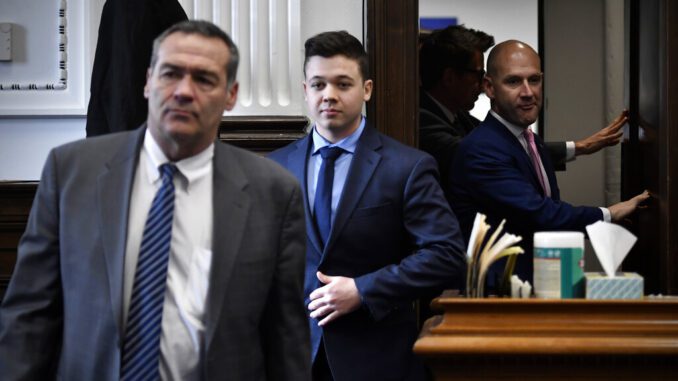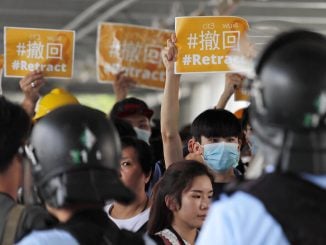
KENOSHA, Wis. — Kyle Rittenhouse was acquitted of all charges Friday after pleading self-defense in the deadly Kenosha shootings that became a flashpoint in the nation’s debate over guns and protest against law enforcement.
Rittenhouse, 18, cried and hugged one of his attorneys upon hearing the verdict.
He had been charged with homicide, attempted homicide and reckless endangering after killing two men and wounding a third with an AR-style semi-automatic rifle during a tumultuous night of protests in the summer of 2020.
The jury deliberated for close to 3 1/2 days.
Rittenhouse could have gotten life in prison if found guilty on the most serious charge, first-degree intentional homicide, or what some other states call first-degree murder.
As the verdict drew near, Gov. Tony Evers pleaded for calm and said 500 National Guard members would be ready for duty in Kenosha if needed.
Rittenhouse was 17 when he went from his home in Antioch, Illinois, to Kenosha after businesses in the city were ransacked and burned over the shooting of a black man, Jacob Blake, by a white police officer.
Carrying a weapon that authorities said at the time was illegally purchased for the underage Rittenhouse, he joined other armed citizens in what he said was an effort to protect property and provide medical aid.
Bystander and drone video captured most of the frenzied chain of events that followed: Rittenhouse killed Joseph Rosenbaum, 36, then shot to death protester Anthony Huber, 26, and wounded demonstrator Gaige Grosskreutz, now 28.
Prosecutors portrayed Rittenhouse as a “wannabe soldier” who had gone looking for trouble that night and was responsible for creating a dangerous situation in the first place by pointing his rifle at demonstrators.
But Rittenhouse testified: “I didn’t do anything wrong. I defended myself.”
Breaking into sobs at one point, he told the jury he opened fire after Rosenbaum chased him and made a grab for his gun. He said he was afraid his rifle was going to be wrested away and used to kill him.
Huber was then killed after hitting Rittenhouse in the head or neck with a skateboard, and Grosskreutz was shot after pointing a gun of his own at Rittenhouse.
The bloodshed in Kenosha took place during a summer of violent protests set off across the U.S. by the killing of George Floyd in Minneapolis.
While some Americans condemned Rittenhouse as a vigilante, others hailed him as a hero who exercised his Second Amendment gun rights and tried to put a stop to lawlessness.
Then-President Donald Trump said it appeared Rittenhouse had been “very violently attacked.” Supporters donated more than $2 million toward his legal defense.
Rittenhouse had also been charged with possession of a dangerous weapon by a person under 18, a misdemeanor that had appeared likely to lead to a conviction. But Judge Bruce Schroeder threw out that charge before jury deliberations.
Video and testimony from some of the prosecution’s own witnesses seemed to buttress Rittenhouse’s claim of self-defense.
Witnesses described Rosenbaum as “hyperaggressive” and said that he dared others to shoot him and threatened to kill Rittenhouse earlier that night. A videographer testified Rosenbaum lunged for the rifle just before he was shot, and a pathologist said his injuries appeared to indicate his hand was over the barrel.
Also, Rosenbaum’s fiancee disclosed that he was on medication for bipolar disorder and depression. Rittenhouse’s lawyers branded Rosenbaum a “crazy person.”


